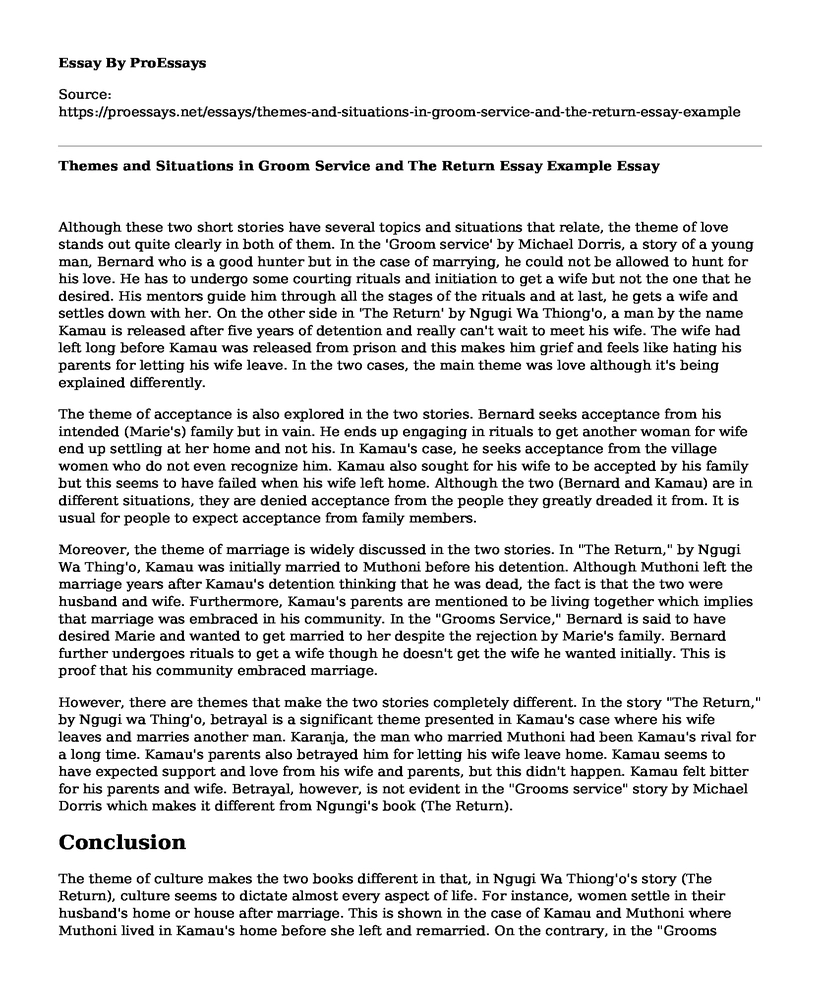Although these two short stories have several topics and situations that relate, the theme of love stands out quite clearly in both of them. In the 'Groom service' by Michael Dorris, a story of a young man, Bernard who is a good hunter but in the case of marrying, he could not be allowed to hunt for his love. He has to undergo some courting rituals and initiation to get a wife but not the one that he desired. His mentors guide him through all the stages of the rituals and at last, he gets a wife and settles down with her. On the other side in 'The Return' by Ngugi Wa Thiong'o, a man by the name Kamau is released after five years of detention and really can't wait to meet his wife. The wife had left long before Kamau was released from prison and this makes him grief and feels like hating his parents for letting his wife leave. In the two cases, the main theme was love although it's being explained differently.
The theme of acceptance is also explored in the two stories. Bernard seeks acceptance from his intended (Marie's) family but in vain. He ends up engaging in rituals to get another woman for wife end up settling at her home and not his. In Kamau's case, he seeks acceptance from the village women who do not even recognize him. Kamau also sought for his wife to be accepted by his family but this seems to have failed when his wife left home. Although the two (Bernard and Kamau) are in different situations, they are denied acceptance from the people they greatly dreaded it from. It is usual for people to expect acceptance from family members.
Moreover, the theme of marriage is widely discussed in the two stories. In "The Return," by Ngugi Wa Thing'o, Kamau was initially married to Muthoni before his detention. Although Muthoni left the marriage years after Kamau's detention thinking that he was dead, the fact is that the two were husband and wife. Furthermore, Kamau's parents are mentioned to be living together which implies that marriage was embraced in his community. In the "Grooms Service," Bernard is said to have desired Marie and wanted to get married to her despite the rejection by Marie's family. Bernard further undergoes rituals to get a wife though he doesn't get the wife he wanted initially. This is proof that his community embraced marriage.
However, there are themes that make the two stories completely different. In the story "The Return," by Ngugi wa Thing'o, betrayal is a significant theme presented in Kamau's case where his wife leaves and marries another man. Karanja, the man who married Muthoni had been Kamau's rival for a long time. Kamau's parents also betrayed him for letting his wife leave home. Kamau seems to have expected support and love from his wife and parents, but this didn't happen. Kamau felt bitter for his parents and wife. Betrayal, however, is not evident in the "Grooms service" story by Michael Dorris which makes it different from Ngungi's book (The Return).
Conclusion
The theme of culture makes the two books different in that, in Ngugi Wa Thiong'o's story (The Return), culture seems to dictate almost every aspect of life. For instance, women settle in their husband's home or house after marriage. This is shown in the case of Kamau and Muthoni where Muthoni lived in Kamau's home before she left and remarried. On the contrary, in the "Grooms service," by Michael Dorris Bernard goes to live in the wife's house after marriage. This is evidence that the two books are set in different cultures although the themes presented are similar. One book, "Grooms service," by Michael Dorris explores a Native American culture while "The Return," by Ngugi Wa Thing'o explains culture in Africa.
References
Dorris, M. (n.d). Groom Service.
Thion'go, N. (n.d). The Return.
Cite this page
Themes and Situations in Groom Service and The Return Essay Example. (2022, Oct 23). Retrieved from https://proessays.net/essays/themes-and-situations-in-groom-service-and-the-return-essay-example
If you are the original author of this essay and no longer wish to have it published on the ProEssays website, please click below to request its removal:
- The Sense of Entitlement in Shakespeare's King Lear - Critical Essay
- Poetry Analysis Essay on "College of Echos" by Isabella Gardner
- Essay on Immigrants' Feelings of Outcasts: Padel's You Shiva and My Mum
- Exploring Class, Gender, Power, and Inheritance in E.M. Forster's Howards End: An Essay Sample
- Essay on Crazy English: The Most Important Language Despite Its Contradicting Vocabulary
- Essay Sample on Othello: Love, Hate, & Tragedy in Shakespeare's Classic Play
- A rose for Emily and Sonny's blues Essay







